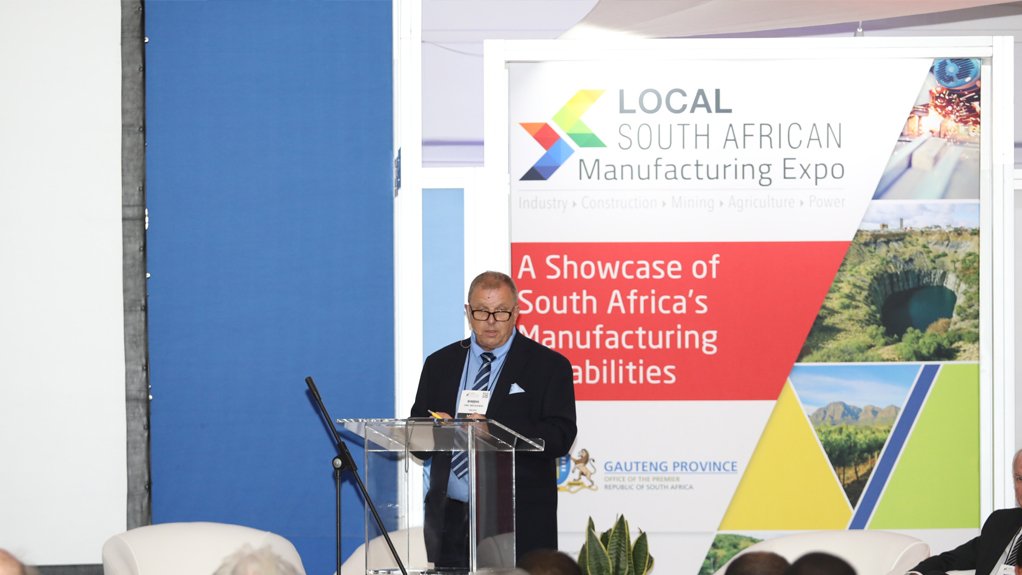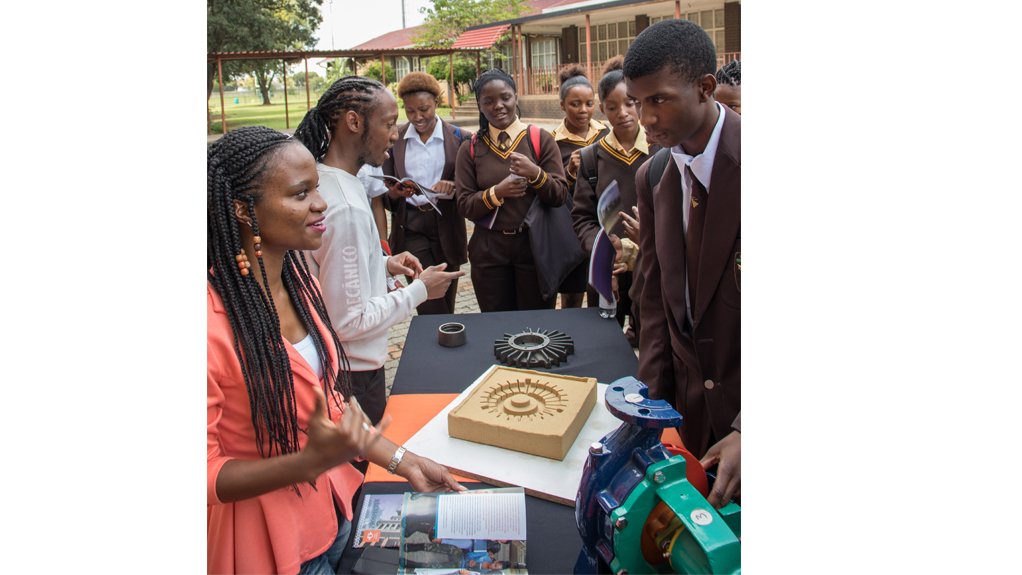South African capital equipment representative the South African Capital Equipment Export Council (SACEEC) will host the pioneer Local Southern African Manufacturing Expo next year to promote localisation and showcase the country’s manufacturing industry, SACEEC CEO Eric Bruggeman tells Engineering News.
The expo will be held from May 21 to 23 at the Nasrec Expo Centre, in Johannesburg.
In addition to boosting the sales of locally manufactured equipment, the expo aims to showcase Southern Africa’s local manufacturing capabilities across a variety of sectors. Manufacturers from agroprocessing, automotive, business process outsourcing, capital equipment, chemicals, construction, engineering, food and beverage, furniture, information and communications technology, as well as those in electronics, metals, mining, plastics, textiles and transport, are set to exhibit.
“We want to show State-owned enterprises (SOEs) and municipalities, as well as international buyers, the capabilities of Southern African manufacturing.”
Bruggeman highlights that exhibitors must be local manufacturers, with no imported equipment allowed for display. “Neither foreign companies nor any Southern African companies that do not manufacture locally will feature at the exhibition – it’s all about local manufacturing.”
The SACEEC has earmarked 3 500 m2 of stand space, and Bruggeman says the council has secured several big companies for the event, and “is well on target for organising the event and achieving a high attendance”.
Local Showcase
The expo will serve to demonstrate the country’s strong export potential, and export opportunities will be enhanced by providing local companies with access to the global market, states Bruggeman.
The expo will position hundreds of the country’s leading local manufacturers to thousands of potential national and international investors, with captains of industry, as well as local and global senior representatives with purchasing power, expected to attend. These attendees will represent the public and private sector, industry and manufacturing, as well as logistics and supply chain management.
The event will also provide industry insights, with visitors treated to a series of free-to-attend seminars by exhibitors and industry experts, who will highlight industry challenges and opportunities. The expo will also allow for networking, and Bruggeman notes that there will be much focus on business- to-business opportunities.
He acclaims that the event is receiving favourable support from government entities, having been endorsed by the Premier of Gauteng and provincial economic developer the Gauteng Growth and Development Agency.
With the expo serving as a platform to highlight the importance of local manufacturing, Bruggeman emphasises that this is key to unlocking the country’s economic empowerment and growth and reducing unemployment.
“When organisations in the country import capital equipment, we are essentially employing thousands of people from overseas – whereas if we were to manufacture equipment locally, we would bolster the country’s economy and job market significantly. Without local manufacturing, we cannot hope to employ people in the country.”
The SACEEC is working in partnership with trade show organiser Specialised Exhibitions Montgomery (SEM) to organise the event. Bruggeman indicates that the council elected to partner with SEM as they are one of the largest trade show organisers in Africa.
Response to the planned expo has been good thus far, as it is the first time that the council has an exhibition dedicated to local manufacturers only.
“We’re looking forward to hosting this event, and we’re asking Southern African companies, mines, municipalities and SOEs to support it.”
Bruggeman indicates that the local capital equipment manufacturing industry is “quiet”, which he attributes to uncertainty regarding the new Mining Charter and land reform as well as a lack of capital spend on equipment by SOEs, owing to the ongoing inquiry into State capture. This has resulted in localisation not occurring sufficiently in South Africa, he laments.
However, the capital equipment export industry, by contrast, is doing well, with SACEEC member companies – which are engaged in exporting – remaining on budget, he adds.
The SACEEC represents the capital equipment and project sector for new projects and for the after-sales market. Bruggeman informs that members – of which there are more than 200 – are active in the construction, mining, agriculture, power, processing and services industries. Mining constitutes 40% of the council’s membership, with the remaining 60% constituting general engineering manufacturing industries.
To mitigate the aforementioned difficulties in localisation across the industry spectrum, SACEEC is assisting members in developing their businesses through exporting. The council attends more than 30 exhibitions locally, and in Africa and other continents yearly, and introduces members to buyers to bolster export sales.
Moreover, the council hosts a number of inward buying missions at events, such as Electra Mining Africa, where about 50 buyers worldwide will come to meet South African manufacturers, enthuses Bruggeman.
Bruggeman will give four talks at Electra Mining Africa, where he will address local manufacturing and its importance, and how to combine local manufacturing with exports.
The Local Southern African Manufacturing Exhibition will also assist in assuaging the difficulties in localisation, with the SACEEC having invited buyers from 25 countries from inward buying missions.
School Programme
A key focus area for the SACEEC is its school programme through which retired artisans assist students with practical skills in the workshop for a variety of trade disciplines.
It is being implemented at four technical high schools in Gauteng: Rhodesfield Technical High School, in Kempton Park, Hans Moore High School, in Benoni, Springs Technical High School, in Springs, and Fumana Comprehensive School, in Katlehong.
The programme applies to learners from Grade 10 to 12, after which they can be put forward for an apprentice programme. The theoretical programme takes between 28 and 38 weeks, depending on the trade.
Following the completion of an apprenticeship, the council identifies a host company from its member companies, where students may undertake practical training, with the ultimate aim of providing full-time employment for the student. “So far, all our apprentices have been employed by companies,” enthuses Bruggeman.
The SACEEC ensures that students participating in the programme have the required marks, with psychological assessments also being conducted to ensure that students have the motivation to work in the industry and are suited to the specific trade.
At the end of the programme, participants receive a Red Seal quali- fication – a qualification awarded to those who undertake a practical apprenticeship followed by a trade test. Therefore, this puts participants on par with other qualified artisans in the country, Bruggeman notes.
Currently, there are 426 students enrolled in the programme. The company has been running the programme with Fumana Comprehen- sive School for three years, but it is the first year of implementation for the other three schools.
Bruggeman notes that the biggest challenge for the council is the equipment at schools, as it is often old and does not work properly, with mentors having to maintain and fix it.
Despite this, he avers that the students are motivated, which fulfils the SACEEC’s aim of showing them that they have career options. He highlights the biggest success thus far as Fumana Comprehensive School’s achieving a very high matric pass rate last year, with an average of 65%.
“This proves that the programme is working,” says Bruggeman.
The SACEEC has also been running a business mentorship programme for 64 black industrialists since 2016. Bruggeman indicates that participants in this programme are small-business owners, while some of them have been in business for more than 20 years, but are still in the informal sectors, and require assistance to grow.
The SACEEC assists with marketing, financial and business plans, as well as access to market. Training is conducted on site at participants’ business facilities.
“We’ve had some successes with this programme, with mentees starting to understand business and marketing.”
Edited by: Zandile Mavuso
Creamer Media Senior Deputy Editor: Features
EMAIL THIS ARTICLE SAVE THIS ARTICLE
ARTICLE ENQUIRY
To subscribe email subscriptions@creamermedia.co.za or click here
To advertise email advertising@creamermedia.co.za or click here

















